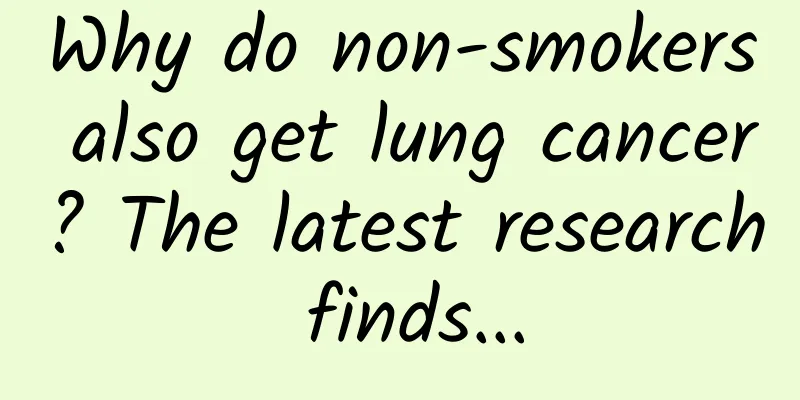Will ovulation occur if menstruation does not come? Let you learn professional knowledge!

|
Women's menstruation and ovulation are two different periods, but experts say that women's menstruation and ovulation periods are not independent, but influence each other. Usually the ovulation period comes before the menstruation period, so the ovulation period will affect the menstruation period, rather than the menstruation period affecting the ovulation period in turn, so the order must be made clear. 1. Will I still ovulate if I don’t have my period? To be precise, there will be no normal menstruation without ovulation, not that there will be no ovulation without menstruation. Because the normal cycle is like this: first the follicles develop, and the endometrium begins to proliferate in preparation for pregnancy. After ovulation, if the sperm and egg do not combine, or if implantation fails, the proliferating endometrium begins to shed and bleed, which is the onset of menstruation. In fact, the process of menstruation is a process of failed conception. 2. What are the dangers of not ovulating? 1. Infertility: The biggest harm of not ovulating is that it can lead to female infertility. Having children is a woman’s natural duty and the most important characteristic that distinguishes women from men. Although there are many DINKs now, if a woman is infertile, it is still a serious blow. Many families have been broken up because of female infertility. 2. Gynecological cancer: Nowadays, there are more and more gynecological cancers, such as endometrial cancer and breast cancer. These terrible cancers are also caused by the fact that women do not ovulate, which leads to sex hormone metabolism disorders, excessive proliferation of the endometrium and the lack of cyclical progesterone to counteract the effect. 3. Menstrual disorders: Anovulation can cause a series of menstrual disorders in women, such as menstrual disorders and amenorrhea, and can also lead to symptoms such as hirsutism and obesity. 3. What to do if you don’t ovulate 1. Reasonable weight control: Now is an era where thinness is considered beautiful. Many people lose weight and go on a diet for the sake of beauty, but there are another group of people who do not care about other people's eyes and still insist on their theory that "obesity is a blessing." In fact, being too obese not only causes many diseases, but also interferes with the coordination of the endocrine system. Reasonable weight control can help prevent and treat anovulatory diseases. 2. Pay attention to changes in the menstrual cycle: Changes in the menstrual cycle can directly reflect many diseases in the body. The normal menstrual cycle is about 25-35 days. When approaching ovulation, there will be a little secretion in the female vagina. 3. Pay attention to your diet: A reasonable diet is not only helpful for women with anovulation, but also plays an important role in all aspects of body function. Smoking and drinking can affect fertility for both men and women. Be careful not to drink too much carbonated drinks such as cola, and also avoid consuming too many high-calorie foods. |
<<: I have been bleeding slightly after having the IUD inserted. What should I do?
>>: What are the precautions during menstruation?
Recommend
What anti-inflammatory medicine should I take for lower body pain after losing my virginity?
We all know that women have a hymen before they h...
The advantages and disadvantages of women taking Liuwei Dihuang Pills
Liuwei Dihuang Pills are not a medicine exclusive...
Can pregnant women drink mung bean porridge?
Pregnant women need to pay attention to their die...
Causes and treatments of swollen eyelids
Some female friends who often stay up late will h...
Is it serious if fetal heart rate monitoring fails?
Is it serious if fetal heart rate monitoring is u...
Why does cervical erosion cause brown discharge?
Cervical erosion is a common clinical disease, wh...
Can I get pregnant on the first day after my period?
Since we know that having sex right after menstru...
When you have acute angina pectoris, should you choose quick-acting heart-saving pills or nitroglycerin?
According to a recent research report from the Ch...
How do diabetics survive the dog days of summer (Strategy 3)
The hot summer days are unbearable, often making ...
Working in front of the computer for 8 hours while pregnant
If you are pregnant and you sit in front of the c...
44-year-old suddenly stopped menstruating
Menstruation is a normal physiological manifestat...
How to prevent and treat Alzheimer's disease and Parkinson's disease
As the global population ages, the incidence of n...
Causes of lower abdominal pain in women
Women often suffer from lower abdominal pain for ...
Can I still have another abortion after having it 10 times?
After the sexual liberalization, most young peopl...
Is it easy to get pregnant with vaginitis?
After suffering from vaginitis, it will affect wo...









